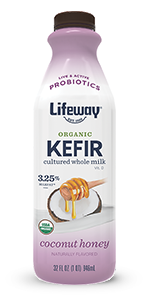Start your Smoothie Saturday by blending our Carrot Ginger Turmeric Smoothie. These anti-inflammatory superfoods, along with the immune-supporting nutrients found in our kefir, may help reduce inflammation and support the microbiome. Give your gut the strength it needs for the upcoming holiday season and make this golden creation!
A Rainbow of Nutrition and Taste
With colorful flesh and versatile use, a variety of carrots have been around the world for thousands of years. Food historians estimate that orange carrots gained popularity in the 1500s. While orange carrots have long been the favorite at most American tables, you will find colorful varieties in different regions around the globe. All varieties of carrots are extremely nutrient-dense and a great addition to a healthy diet – they’re high in fiber and rich in potassium, vitamin C, and vitamin K. However, each individual color contains a specific set of phytonutrients (antioxidants) which offer slightly different nutritional benefits.
Orange carrots contain the highest concentrations of alpha- and beta-carotene. Alpha- and beta-carotene promote and support your body’s production of vitamin A, which is a necessary vitamin for healthy eyes.
Red carrots are rich in lycopene (as are tomatoes – it’s the phytonutrient that gives red fruits and veggies color) and beta-carotene. Lycopene has been shown in some studies to reduce the risk of heart disease and some types of cancer, including prostate and cervical cancer.
Yellow carrots contain the phytonutrient lutein, which is linked to the reduced risk of certain age-related eye diseases, including macular degeneration and cataracts.
Purple carrots are high in anthocyanins, as well as alpha- and beta-carotene. Anthocyanins have been shown to have anti-inflammatory properties, help protect against heart-related diseases, and support a healthy immune system.
Cultured Dairy: The Nutrition Benefits You Need to Know
With increasing research linking the correlation between probiotics, gut health, and immunity, it’s no secret that the integrity of our gut is vital to our health. Although additional factors such as stress, antibiotic usage, and individual health conditions can contribute to the condition of our gut, a focus on healthy food choices is one of the easiest ways to support the microbiome.
Several studies have shown a strong association between the gut-brain-microbiota. Probiotics introduced to the gut have been found to support immunity, improve allergies, and improve digestion.
Studies have shown that reduced diversity of healthy gut bacteria during early years is associated with an increase in food allergies during school-age years. In addition, kefir made from whole milk helps absorb key nutrients such as Vitamins A, D, E, and K. Vitamin K is important because it helps your bones absorb calcium. It’s important to know that kefir contains a special trio: vitamin D, K, and calcium – all three crucial elements to support bone health.
Prebiotics + Probiotics = a Healthy You
Prebiotics are non-living, non-digestible carbohydrates (fiber) naturally found in a variety of foods. Your body actually doesn’t digest prebiotics. Instead, prebiotics are what probiotics feed off of to remain active in the digestive tract. Probiotics feed off prebiotic fibers for fuel, and the two work in your digestive system to keep your microbiome happy. They help the digestive system by promoting the growth of good bacteria. Prebiotics and probiotics work together in balance to make sure our digestive system stays on track and regular. Research has found that consuming a variety of prebiotic and probiotic food sources may improve your body’s natural functions, including your immune system and digestive system.
Servings: 1 - 2Ingredients
- 1 cup Organic Whole Milk Coconut Honey Kefir
- 1 cup frozen pineapple chunks
- 1 medium carrot, peeled and chopped
- 1 frozen banana
- 1/2 tsp ground turmeric
- 1/4 tsp ginger
- handful of ice
Directions
- Blend together all ingredients and enjoy!

